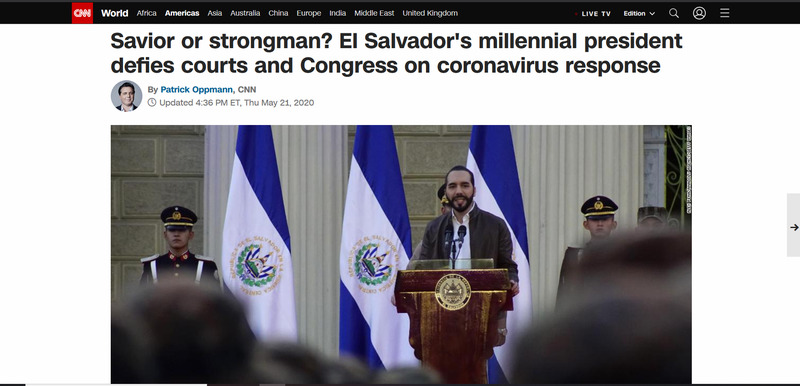Item
“Savior or strongman? El Salvador's millennial president defies courts and Congress on coronavirus response”
Title (Dublin Core)
“Savior or strongman? El Salvador's millennial president defies courts and Congress on coronavirus response”
Description (Dublin Core)
Aside from being the death of hundreds of thousands, COVID-19 may also be the impetus for the decline of democracy in El Salvador, one of the smallest countries in Latin America. In an article for CNN, journalist Patrick Oppmann provides a brief summary of how El Salvador’s populist president, Nayib Bukele, is taking advantage of the pandemic to attack the nation’s political institutions and consolidate personal power.
Ever since he was elected as a political outsider in 2019, President Nayib Bukele has utilized social media to attack his political opponents and journalists, who he believes are obstacles to his personal agenda. He also marched soldiers into the National Assembly to intimidate lawmakers into signing a bill to increase police and military funding, arousing the fear of those who remembered El Salvador’s history of military dictatorships. The emergence of COVID-19 has given Bukele the opportunity to further attack the nation’s institutions and to consolidate his own power. He placed stringent quarantine measures and deployed military policemen on the streets to catch violators, who would then be sent to quarantine centers. Bukele also used the pandemic to go after gangs such as MS-13, whose members were rounded up and taken to densely packed prisons and stripped naked. This particular measure not only violated human rights, it also harmed efforts to reintegrate gang members, according to a former gang member interviewed by Oppmann. Despite these heavy handed measures, Bukele and his administration maintain high approval ratings.
Bukele has leveraged this high approval rating to ignore El Salvador’s Supreme Court and National Assembly. The former ruled that he had no authority to extend lockdown orders, while the former proposed a bill to reopen the nation’s economy ahead of the reopening date scheduled by Bukele. Rather than acceding to their demands, Bukele had instead taken to social media, castigating both of these institutions as unrepresentative and illegitimate. Oppmann ends his article by noting that, as the pandemic continues, there will most likely be more clashes between El Salvador’s young, populist president and the nation’s other institutions.
Ever since he was elected as a political outsider in 2019, President Nayib Bukele has utilized social media to attack his political opponents and journalists, who he believes are obstacles to his personal agenda. He also marched soldiers into the National Assembly to intimidate lawmakers into signing a bill to increase police and military funding, arousing the fear of those who remembered El Salvador’s history of military dictatorships. The emergence of COVID-19 has given Bukele the opportunity to further attack the nation’s institutions and to consolidate his own power. He placed stringent quarantine measures and deployed military policemen on the streets to catch violators, who would then be sent to quarantine centers. Bukele also used the pandemic to go after gangs such as MS-13, whose members were rounded up and taken to densely packed prisons and stripped naked. This particular measure not only violated human rights, it also harmed efforts to reintegrate gang members, according to a former gang member interviewed by Oppmann. Despite these heavy handed measures, Bukele and his administration maintain high approval ratings.
Bukele has leveraged this high approval rating to ignore El Salvador’s Supreme Court and National Assembly. The former ruled that he had no authority to extend lockdown orders, while the former proposed a bill to reopen the nation’s economy ahead of the reopening date scheduled by Bukele. Rather than acceding to their demands, Bukele had instead taken to social media, castigating both of these institutions as unrepresentative and illegitimate. Oppmann ends his article by noting that, as the pandemic continues, there will most likely be more clashes between El Salvador’s young, populist president and the nation’s other institutions.
Date (Dublin Core)
Creator (Dublin Core)
Contributor (Dublin Core)
Type (Dublin Core)
link
Link (Bibliographic Ontology)
Controlled Vocabulary (Dublin Core)
Curator's Tags (Omeka Classic)
Contributor's Tags (a true folksonomy) (Friend of a Friend)
Collection (Dublin Core)
English
Law Enforcement
Date Submitted (Dublin Core)
11/04/2020
Date Modified (Dublin Core)
01/30/2021
02/05/2021
Item sets
This item was submitted on November 4, 2020 by Carlos Castro using the form “Share Your Story” on the site “A Journal of the Plague Year”: https://covid-19archive.org/s/archive
Click here to view the collected data.
